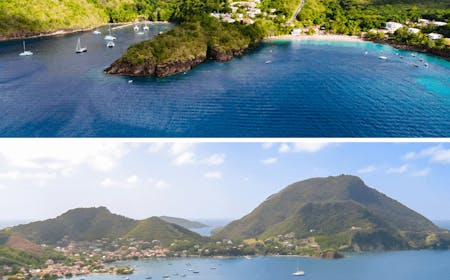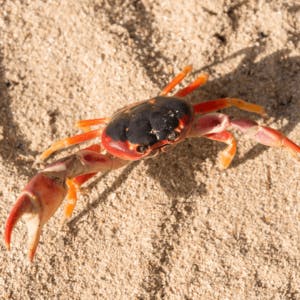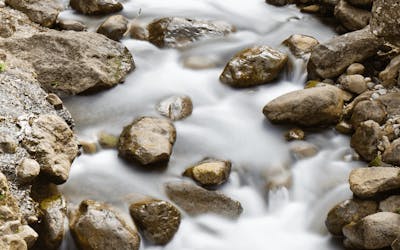
Martinique or Guadeloupe : Which island to choose ?
You are thinking about your next trip and you already know that you want to go far away, in the sun, to enj...
Martinique is a small French-speaking island in the Caribbean Sea which effortlessly blends European splendour with the vibrant Caribbean culture of the region. Surrounded by vast beaches and lush rainforests, it also boasts splendid local cuisine and exclusive shopping opportunities, but is it safe to travel in Martinique?
Fort-de-France showcases Martinique's diverse marriage of different cultures and experiences. The local Victorian architecture is surrounded by beaches and tropical plant life. Fort-de-France also boasts a handful of Martinique's most renowned restaurants.
Saint-Pierre is another very popular destination in Martinique. This town is a gateway to the wildlife and natural terrain of the island, such as Mount Pelée, a volcanic mountain.
Health and safety precautions in Martinique should be considered if you intend to visit this splendid tiny Caribbean nation. Martinique is a department of France in the French West Indies and one of the most famous tourist destinations of the Windward Islands. However, travelling abroad still brings some risk, so you will want to know about security in Martinique and how you can plan for it.
Martinique is a popular tourist destination, but you do need to take precautions to ensure safe travel. One should avoid walking late at night, particularly along the beaches, and please always guard your personal possessions closely.
Martinique has a Level 1 Travel Advisory which means that when travelling to this beautiful island for vacations, travelers will exercise "standard precautions" It is important to remember that, whilst it is the safest standard of ranking, there will still be a certain amount of risk.
Is Martinique safe from petty crime? Pickpocketing, purse snatching, and auto theft occur primarily in the capital, Fort de France and its port. Remember, wherever you’re visiting, never leave personal belongings such as currency, credit cards, mobile phones or other electronic gadgets in your rental car, or unattended, particularly on the beaches.
The June to November hurricane season, can affect Martinique.
Review the surroundings and weather patterns before flying to Martinique to reduce any risk when commuting.
Speaking of Natural, the active volcano, Mount Pelée, is one of the best hiking spots on the island! You will also be able to discover the remaining ruins following the volcano's eruption in 1902.
Terrorism is an act, which aims to create fear among ordinary people by illegal means. It is a threat to humanity. It is an act of cowardice. However, in Martinique the risk of terrorism is practically non-existent.
The risk of terrorism doubtless remains low. Calls for independence have been stronger in Martinique than in other French regions, particularly in the 1990s, but this has not resulted in politically driven violence or terrorist attacks. The state of emergency in mainland France established and extended frequently (until July 2017) after the terrorist attacks in Paris in November 2015, did not apply to Martinique.
As an island, Martinique is reasonably isolated from the threat of terror attacks and you can safely explore Martinique :)
Females alone should feel safe to wander or snorkel on the island, but should always be prepared for unwanted attention from men. Ignore them and you are going to be fine. It is not advisable to visit the island's beaches and poorly lit areas after sunset.
Martinique does not face any risk of an outbreak of yellow fever. The government, however, requires proof of vaccination for travellers arriving from countries at risk of transmission of yellow fever. A single dose of the YF vaccine is adequate for continuous life-long immunity.
To ensure that routine vaccines, such as diphtheria, tetanus, polio, pneumonia, influenza, measles, mumps, pertussis, rubella, varicella, etc., are up-to-date, please consult your doctor.
The French West Indies islands are among the most well-developed and modernized Caribbean nations. Martinique's medical and child care services are considered to be some of the best in the eastern Caribbean islands.
If you need to seek medical treatment during your time on Martinique, you can be confident that you are in safe hands. There are approximately 20 hospitals and clinics on the island, most of which have excellent services and experts in every medical field. For every 637 residents of the island, the ratio of physicians to the general populace is approximately one doctor. The island's largest hospital, Pierre Zobda Quikman Hospital , is situated about 3 miles from Fort de France. This hospital has a 24-hour emergency department, which can be accessed on the island by calling 596-596-55-20-00.
There are many pharmacies on the island, including Pharmacy Cypria in Fort de France which you can call on 596-63-22-25 and Pharmacie de la Paix, also in Fort de France, 596-71-94-83. At these pharmacies, tourists will be able to access generic and over-the-counter medications.
Should you have to carry prescription drugs with you, keep them in their specifically labelled original packaging. Crafted pill boxes are not permitted through customs. Additionally, attach a prescription slip or a doctor's note detailing your medication.

Yes, it is very safe to travel and explore the island's beauty.The crime rate is controlled here. However, as with any travel destination, some cases of robbery, auto-theft, hacking and assaults can occur.
In Martinique, you should always remember to use sunscreen, wear a head covering and to drink plenty of water. You need to be careful to avoid fatigue and heatstroke due to the heat and the scorching sun.
It is much safer to travel in groups and to protect yourself from any difficulties and never leave valuables of any kind in your vehicle. Park your car only in safe parking lots, and always ensure that the car is locked and secured.
The island's areas are well lit, so cycling here is safe in the evenings. Nevertheless, always remain cautious and bear safety in mind. Do not take large amounts of cash or wear expensive jewelry.
Always ensure that your passport and other travel documents are secured in your room.
Now that you know how safe Martinique is, let us introduce you to the island with 10 reasons to visit it!

You are thinking about your next trip and you already know that you want to go far away, in the sun, to enj...

You are planning to spend your vacations in Martinique and wish to discover all the treasures of the island...